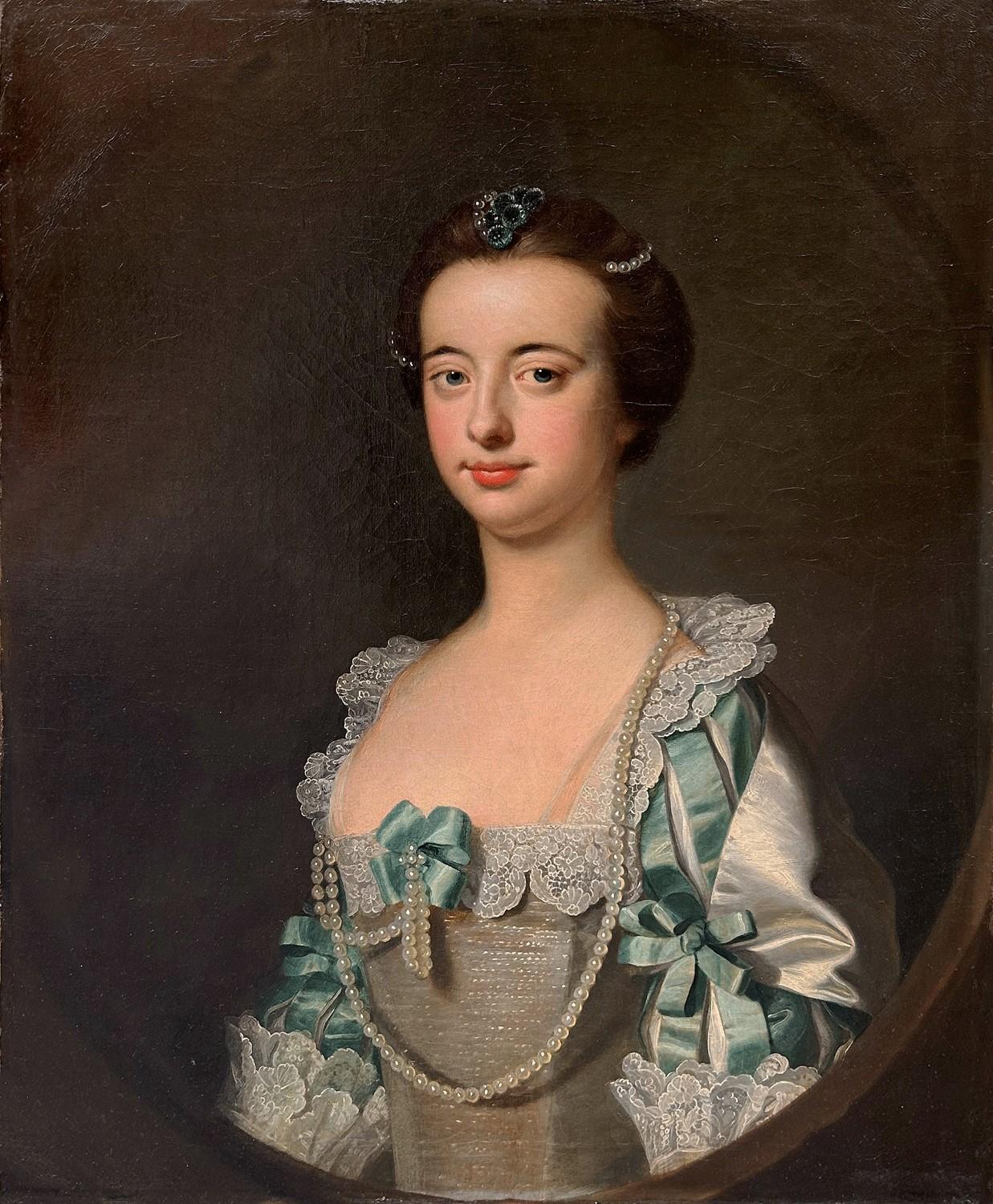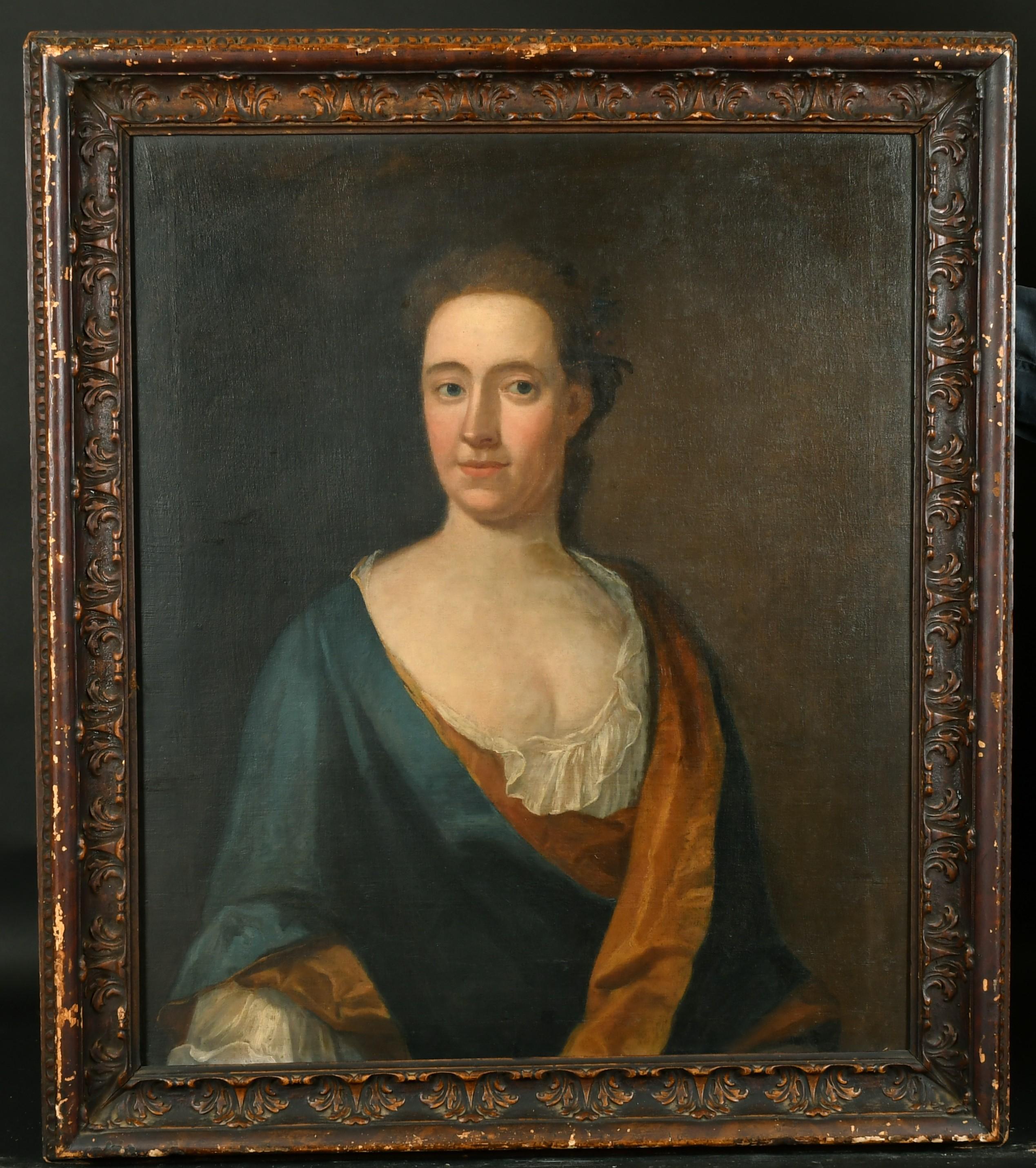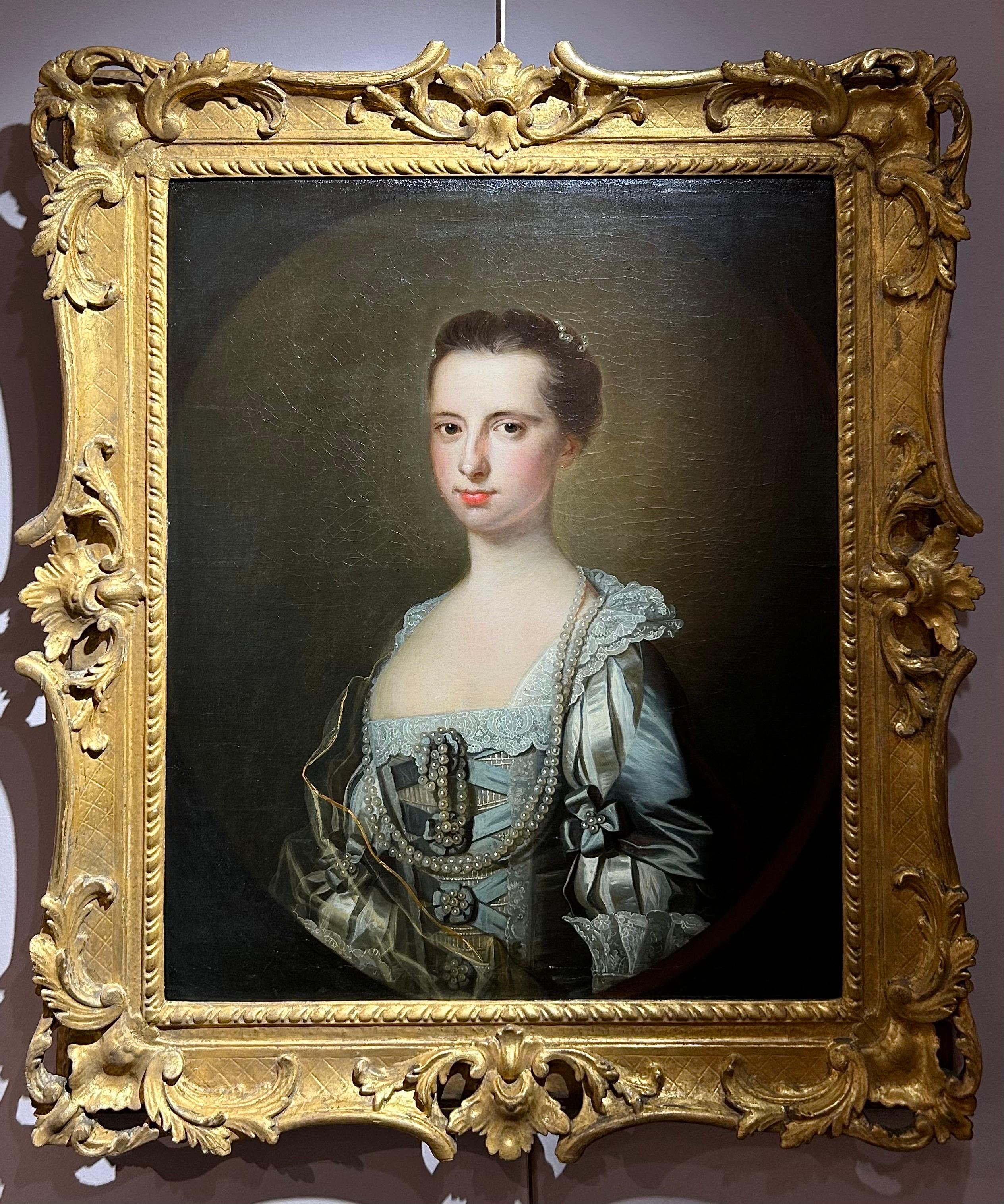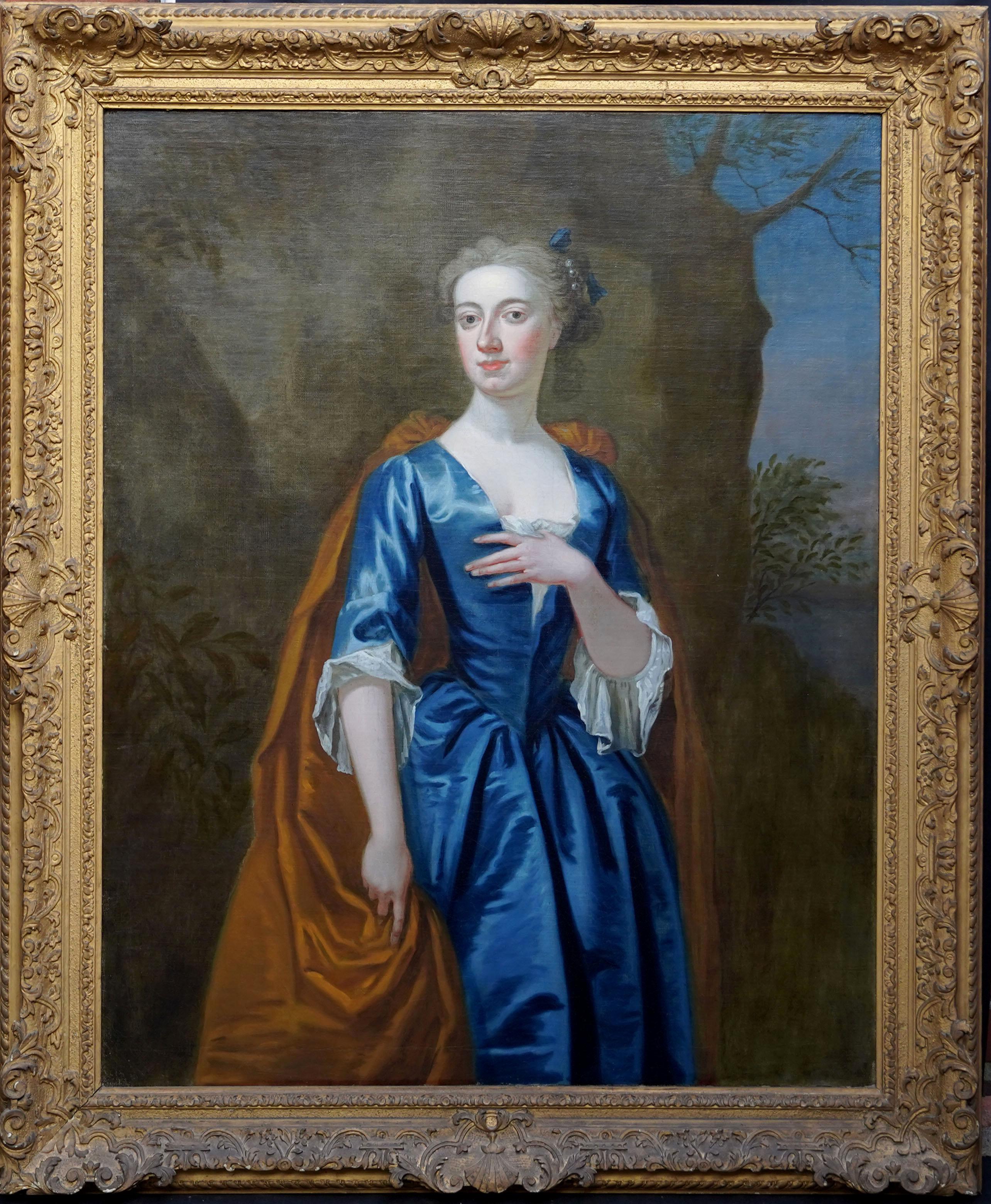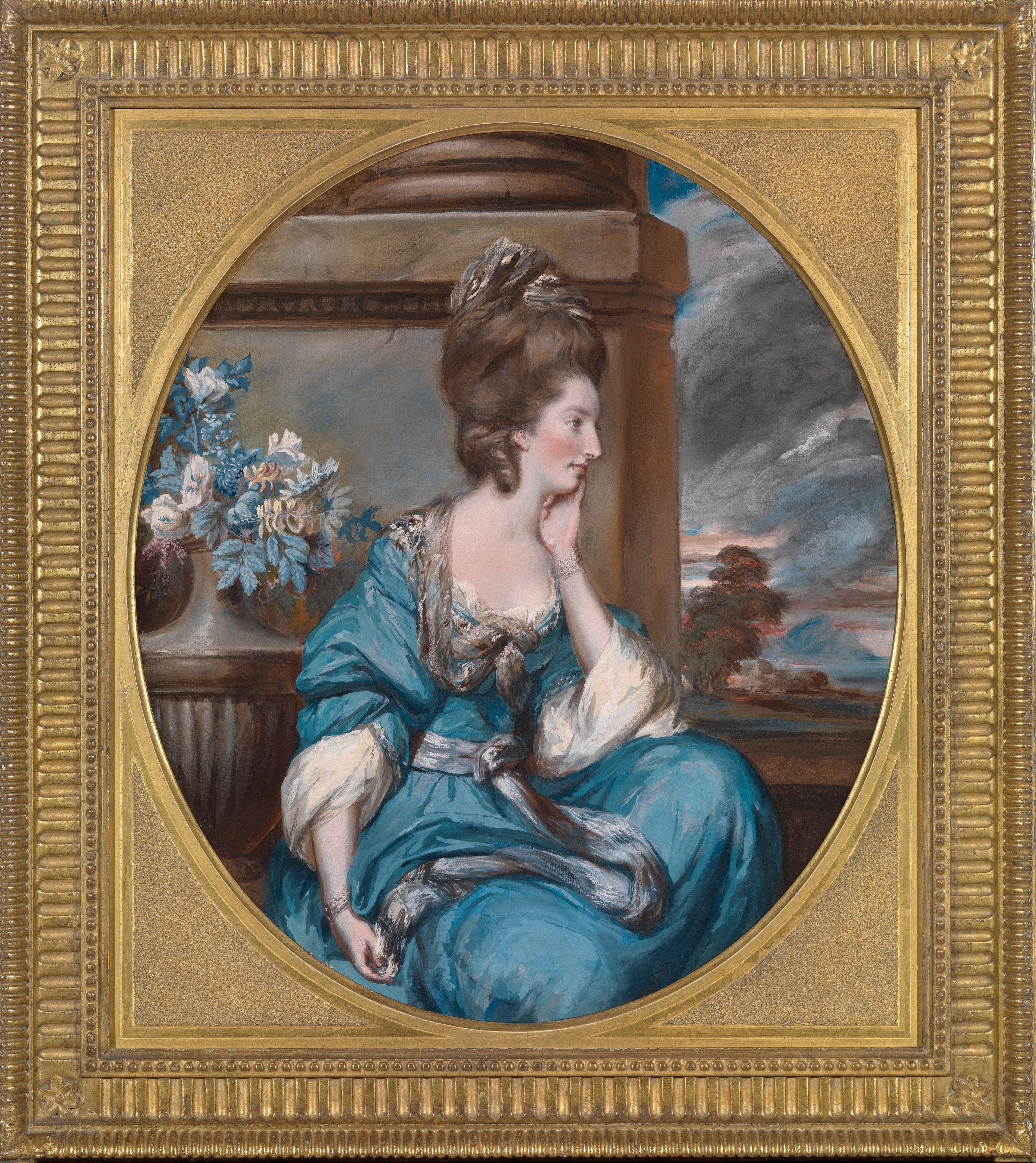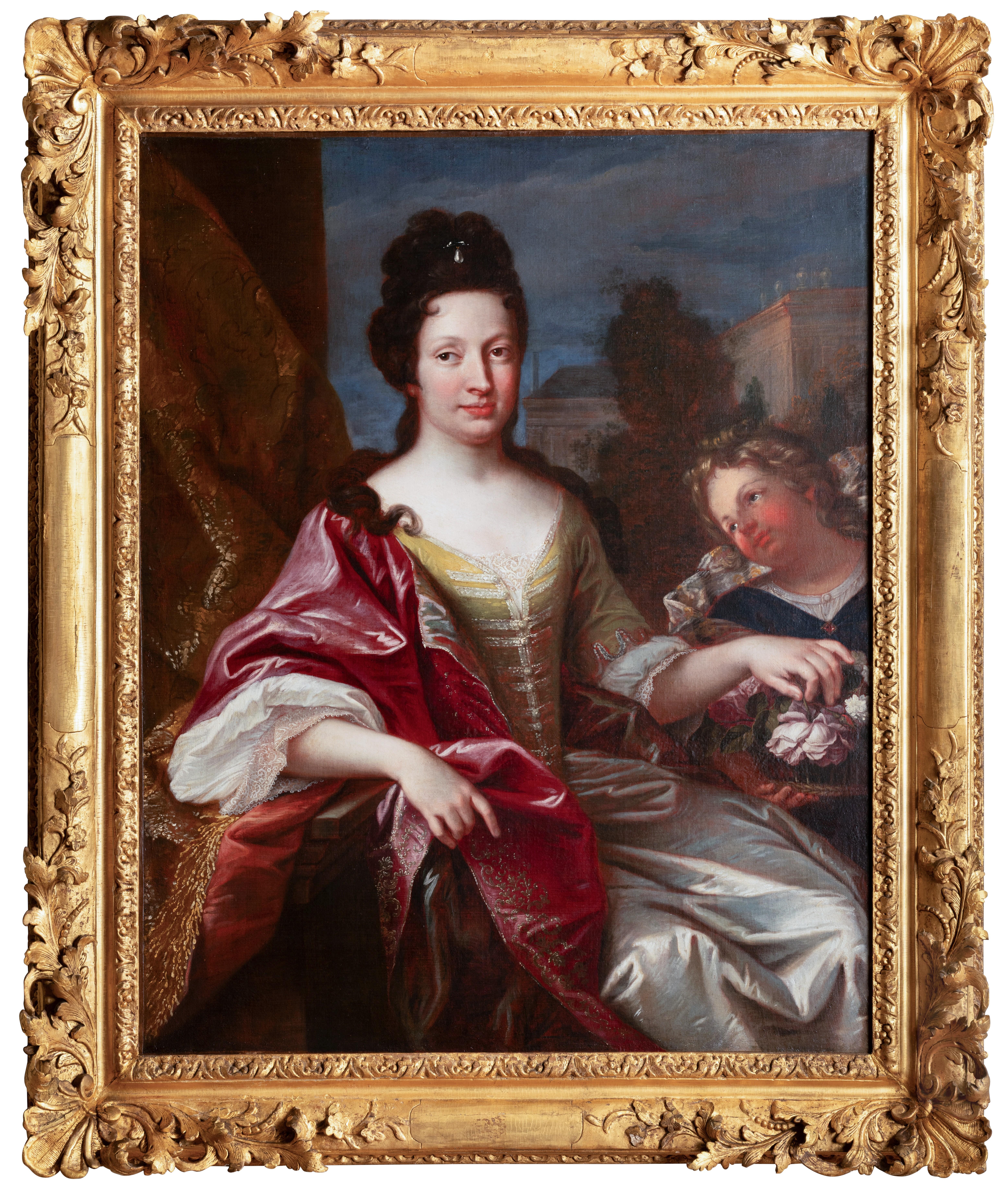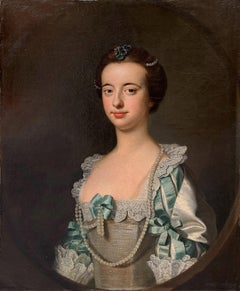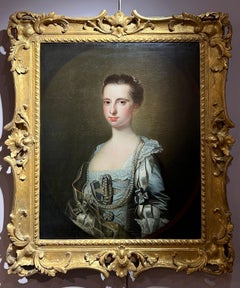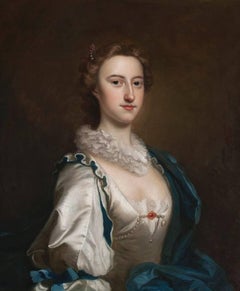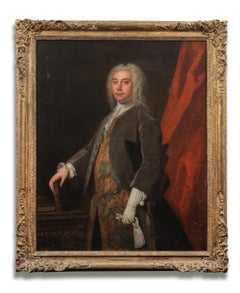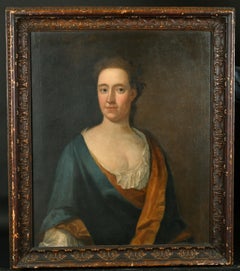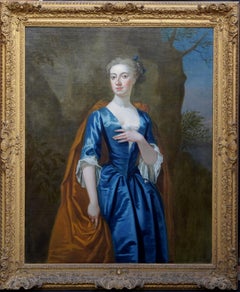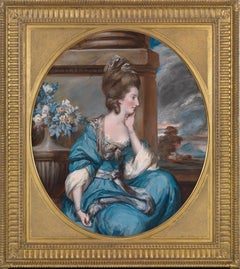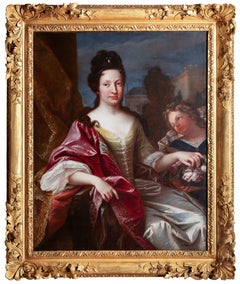Items Similar to Portrait of Ann Austen, nee Grey
Want more images or videos?
Request additional images or videos from the seller
1 of 4
Bartholomew DandridgePortrait of Ann Austen, nee Grey
$15,854.03
£11,500
€13,429.08
CA$21,921.02
A$24,066.54
CHF 12,555.57
MX$291,238.68
NOK 157,364.54
SEK 148,278.77
DKK 100,244.47
About the Item
Signed 'BDandridge/ pinxit' lower left
Provenance
By descent through the sitter's family to
The Collection of R. W. Vivian-Neal of Poundisford Park, Somerset, from whom acquired by
With Lane Fine Art, UK, where purchased by the present owners in 1996
Literature
'Poundisford Park, Somerset' in Country Life, 22 December 1934, ill.
A.W. and C.M. Vivian-Neal, Poundisford Park, Somerset: A catalogue of pictures and furniture, Taunton 1939, cat. nos. 11 and 13
This is a portrait of Ann Austen, nee Grey, three-quarter-length seated in a landscape with her dog. Painted in a superb white satin dress, she holds horn spectacles and a spectacle case (there are references in the family papers to trouble that she had with her eyes). A spaniel presses his head against her crinoline; no doubt it was his kennel which was still in the attic at Dean Street in 1758 when the inventory of her possessions were taken.
Ann was the daughter of William and Ann Grey of Backworth: born on the 30 August 1713, she married Captain Robert Austen in 1748. Ann was brought up at the home of her uncle, Richard Gifford in Poland Street in Soho, until his death in 1739, when she moved to nearby Dean Street, where she continued to live after her marriage until her death in 1753.
The Country Life article compares the composition of Jane's portrait to Gainsborough's celebrated portrait of Mrs Robinson in the Wallace Collection, 'even to the train of convolvulus in the background.'
- Creator:Bartholomew Dandridge (1691 - 1754, British)
- Dimensions:Height: 49 in (124.46 cm)Width: 39 in (99.06 cm)
- More Editions & Sizes:1 of 2Price: $15,854
- Medium:
- Movement & Style:
- Period:
- Condition:
- Gallery Location:London, GB
- Reference Number:1stDibs: LU52410476132
About the Seller
5.0
Vetted Professional Seller
Every seller passes strict standards for authenticity and reliability
Established in 2007
1stDibs seller since 2014
83 sales on 1stDibs
Typical response time: 4 hours
- ShippingRetrieving quote...Shipping from: London, United Kingdom
- Return Policy
Authenticity Guarantee
In the unlikely event there’s an issue with an item’s authenticity, contact us within 1 year for a full refund. DetailsMoney-Back Guarantee
If your item is not as described, is damaged in transit, or does not arrive, contact us within 7 days for a full refund. Details24-Hour Cancellation
You have a 24-hour grace period in which to reconsider your purchase, with no questions asked.Vetted Professional Sellers
Our world-class sellers must adhere to strict standards for service and quality, maintaining the integrity of our listings.Price-Match Guarantee
If you find that a seller listed the same item for a lower price elsewhere, we’ll match it.Trusted Global Delivery
Our best-in-class carrier network provides specialized shipping options worldwide, including custom delivery.More From This Seller
View AllPortrait of Lady Mansfield of Ringwood
By Thomas Hudson
Located in London, GB
Portrait of Lady Mansfield of Ringwood
Oil on Canvas, unsigned
Image size: 25 x 30 inches (63 x 76 cm)
Original carved & gilded frame
Provenance
Descended through the Family Estate
Born in Poland in 1760 to the 2nd Earl of Mansfield and his wife, Elizabeth Mary Murray would later come under the care of her uncle, William Murray (1st Earl of Mansfield) at Kenwood House in Hampstead. David Murray (2nd Earl of Mansfield) was set to inherit the title and full wealth of his uncle, including Kenwood House. Lady Mansfield’s second cousin would soon join her at Kenwood, where they would be raised together and featured in multiple portraits of the time. Her younger sister, Henrietta, is seen in a separate portrait done by Thomas Hudson as well. At the age of 25 she married George Finch-Hatton, an English aristocrat and politician who sat in the House of Commons from 1772-1784.
Gazing out at the viewer, Lady Mansfield wears a decorated dress, with an abundance of pearls and lace, and a transparent gold lined veil surrounding her right shoulder. The excess of luxurious fabric matches another Hudson portrait of another Lady Mansfield, with the lace detailing and complementary bodice. The depiction of this Lady Mansfield epitomizes the style of portraiture in the 18th century, such as the styles Hudson’s pupils Joshua Reynolds, Joseph Wright, and Peter Toms. From Hudson’s travels to the Low Countries and Italy, he no doubt brought back artistic inspiration from the international pieces he encountered.
Thomas Hudson
Hudson was a celebrated 18th century portrait painter. Born in Devon in 1701 he studied under the artist Jonathan Richardson and married his daughter, against Richardson’s wishes.
He had many artistic friends including William Hogarth and Francis Hayman and travelled with them in Europe in 1748. He also visited Italy with the sculptor Louis-François Roubiliac in 1752. Hudson’s style of portraiture proved so successful that for a decade from 1745 to 1755 he was London’s most popular portrait painter and made a fortune painting the cream of London society and members of the Royal Family.
He was also a talented teacher, perhaps too good, as subsequently a number of his former assistants overtook him in popularity including the artist Joshua Reynolds.
Hudson retired in the late 1750’s and died in Twickenham in 1779. His most notable works include portraits of King George II and George Friedrich Handel and his “Portrait of a Nobleman in Van Dyck dress.” Many of Hudson’s works may be seen in art galleries. These include the National Portrait Gallery, the National Maritime Museum, the Tate Gallery, the Foundling Museum and the Bristol City Museum and Art Gallery. His works are also in Museums across the world...
Category
18th Century English School Paintings
Materials
Canvas, Oil
Portrait of Lady Mansfield of Ringwood
By Thomas Hudson
Located in London, GB
Portrait of Lady Mansfield of Ringwood
Oil on Canvas, unsigned
Image size: 25 x 30 inches (63 x 76 cm)
Original carved & gilded frame
Provenance
Descended through the Family Estate
...
Category
18th Century English School Paintings
Materials
Canvas, Oil
Portrait of a Lady, Old Masters 18th Century Oil
By Thomas Hudson
Located in London, GB
Thomas Hudson
1701 – 1779
Portrait of a Lady
Oil on canvas
Image size: 30 x 25 inches
Original carved giltwood frame
Hudson had many assistants, and employed the specialist drapery ...
Category
18th Century Old Masters Portrait Paintings
Materials
Canvas, Oil
Portrait of Ralph William Grey
By Bartholomew Dandridge
Located in London, GB
Provenance
By descent through the sitter's family to
The Collection of R. W. Vivian-Neal of Poundisford Park, Somerset, from whom acquired by
With Lane Fine Art, UK, where purchased by the present owners in 1996
Literature
'Poundisford Park, Somerset' in Country Life, 22 December 1934, ill.
A.W. and C.M. Vivian-Neal, Poundisford Park, Somerset: A catalogue of pictures and furniture, Taunton 1939, cat. nos. 11 and 13
This is a three-quarter-length portrait of Ralph William Grey in a mole-coloured velvet coat and a long waistcoat of green satin, heavily embroidered in gold. Under his left right hand is a black chapeau bras. He has white doe-skin gauntlet gloves.
Son of William and Ann Grey of Backworth: born 19 December 1707. He married Mary the daughter of William Rawstorne of Newall in 1741 and died 5 November 1786. He was educated at Eaton and Trinity College, Oxford.
Within a year of his birth Mrs Grey died and, according to the Country Life article 'From that time forward all Mr Grey's faculties were concentrated on the well-being of his son. The possession of an heir gave zest to his efforts to build up the family fortune: he was successful in most of his ventures. Years later his interest in life was centred in the home of his daughter-in-law and grandchildren'.
Grey's right hand is depicted in the present portrait resting on Locke's Essays and the Country Life article also records that there are constant references to John Locke...
Category
Mid-18th Century English School Portrait Paintings
Materials
Oil
Portrait of a Girl, 18th Century Oil Old Master
By George Knapton
Located in London, GB
George Knapton
1698-1778
Portrait of a Girl
Oil on canvas
Image size: 20 x 18 inches
Original giltwood frame
This beautiful half length portrait of a young woman, turned to left, gazing at the spectator, wearing a pink, white lace-embroidered, dress, in her hair a pink bonnet trimmed with lace to match her dress.
The depiction of a young girl epitomises child portraiture of the late eighteenth century, in which painters such as William Beechey, Joshua Reynolds, Thomas Gainsborough had begun to discover and express the true character of children, in contrast to the stiff, miniature-adults of previous generations.
The Artist
Knapton was born in Lymington, one of four sons of James Knapton. He was apprenticed to Jonathan Richardson from 1715 to 1722, and in 1720 was a founding subscriber to the academy of St. Martin's Lane established by Louis Chéron...
Category
18th Century Old Masters Portrait Paintings
Materials
Canvas, Oil
Portrait of Lady
Located in London, GB
John Westbrooke Chandler
1763- 1807
Oil on canvas
Image size: 30 x 25 inches (76 x 63.5 cm)
Original gilt swept frame
This portrait is marked by its loose brushwork, which creates a...
Category
Late 18th Century Academic Portrait Paintings
Materials
Canvas, Oil
$19,852
You May Also Like
Fine 18th Century British Portrait of an Aristocratic Lady, Large oil painting
Located in Cirencester, Gloucestershire
Circle of Thomas Hudson (1701-1779) British.
18th Century Bust Portrait of a Lady,
Oil on Canvas, Inscribed on a label verso,
canvas: 30" x 25" (76.2 x 63.5cm).
frame: 30 x 25 in...
Category
Mid-18th Century Old Masters Portrait Paintings
Materials
Canvas, Oil
$2,749 Sale Price
20% Off
Portrait of Mrs James Hoste - British 18th century art portrait oil painting
By John Vanderbank
Located in Hagley, England
This superb large three quarter length British Old Master portrait in a landscape oil painting is attributed to circle of John Vanderbank the Younger. Painted circa 1738 the sitter is Mrs James Hoste of South Wootton and Sandringham, nee Hammond. She was the daughter of Anthony Hamond and Susan Walpole, daughter of Robert Walpole, and was sister to Robert, 1st Earl of Oxford. She married Major James Hoste of Sandringham, Norfolk, and they had two daughters. The sheen of her blue satin dress against her gold cloak is stunning. A really lovely 18th century portrait with excellent provenance.
Inscribed with sitter details lower left.
Provenance. By descent within the family of the sitter at West Acre High House, Norfolk;
Cheffins, Cambridge, 'West Acre High House' sale, 24 November 2010, Lot 519; Wood Hall, Arkesden, Essex.
Literature: 'Portraits in Norfolk Houses', Prince Duleep Singh, 1927, No. 36.
Sitter's details on two labels verso.
Condition. Oil on canvas, image size is 50 inches by 40 inches and in good condition.
Frame. Housed in an ornate gilt frame, 58 inches by 48 inches framed and in good condition.
John Vanderbank (1694-1739) was an English portraitist and book illustrator, who enjoyed a high reputation for a short while during the reign of King George...
Category
18th Century Old Masters Portrait Paintings
Materials
Oil
$13,234 Sale Price
20% Off
Portraits of the Hon. Mary Shuttleworth and Anna Maria, 9th Baroness Forrester
By Daniel Gardner
Located in London, GB
THE HON. MARY SHUTTLEWORTH, NÉE COCKBURN (D. 1777)
and her sister
ANNA MARIA, 9TH BARONESS FORRESTER (D. 1808)
Pastel and gouache on paper laid on canvas, on their original backb...
Category
18th Century Old Masters Portrait Drawings and Watercolors
Materials
Pastel, Gouache
Portrait of the French Princess, late 17th c. French school
Located in PARIS, FR
Portrait of the Princess of Conti - Attributed to Louis Ferdinand Elle the Younger (1648-1717)
Late 17th century French school
Oil on canvas, h. 100 cm, l. 80 cm
Important Louis XIV ...
Category
Late 17th Century Old Masters Portrait Paintings
Materials
Canvas, Oil
Portrait of a lady, Elizabeth Ann Sheridan (née Linley; Sep 1754 - Jun 1792)
Located in GB
This refined portrait is believed to depict Elizabeth Ann Sheridan (née Linley; 1754–1792), the celebrated English soprano and wife of playwright Richard Brinsley Sheridan. Painted i...
Category
Late 18th Century Portrait Paintings
Materials
Canvas, Oil
Fine 18th Century British Portrait of an Aristocratic Lady, Large oil painting
Located in Cirencester, Gloucestershire
Circle of Thomas Hudson (1701-1779) British.
18th Century Bust Portrait of a Lady,
Oil on Canvas, Inscribed on a label verso,
canvas: 30" x 25" (76.2 x 63.5cm).
frame: 30 x 25 in...
Category
Mid-18th Century Old Masters Portrait Paintings
Materials
Canvas, Oil
$2,751 Sale Price
20% Off
More Ways To Browse
18th Century English Painting
Antique 18th Century English Frames
18th Century English Portrait
Antique Spectacles
18th Century Art Dog Portraits
Antique Spectacles Case
Vivian M
Portrait Of Child
Antique Royal Portraits
17th And 18th Century Portraits
Male Portrait Paintings
1920 Oil Portraits
Antique Family Portraits
Russia Portrait
Gentleman Oil Portrait
French School 18th Century
Gilt Framed Woman Portrait Oil Paintings
Impressionist Portrait Of A Young Girl
